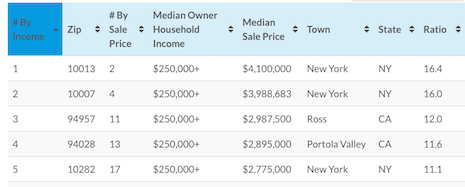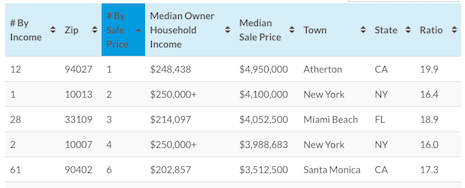 New York and Washington, D.C. are the top-earning regions in the country. Image credit: PropertyShark
New York and Washington, D.C. are the top-earning regions in the country. Image credit: PropertyShark
The most expensive places to live in the United States are concentrated on the West Coast, and yet data from PropertyShark shows that the nation's wealthiest people tend to live in the opposite side of the country.
PropertyShark analyzed the most expensive ZIP codes in the country compared to where the country’s wealthiest people actually live. The data showed that high-income residents do not necessarily live in the most expensive places, an interesting datapoint that should be on any luxury real estate developer's mind.
"The first 11 highest-earning zip codes all feature a yearly median household income of over $250,000. New York leads with 5 of the 11 zip codes that feature top-bracket median incomes, followed by California with 4 zip codes," said Andra Rus, communications specialist at PropertyShark, New York. "Of the top 11 zip codes by median income, the highest ranked based on median sale price is 10013 in Manhattan, which took the 2nd spot."
Wealth disparities
Of the nation’s top earning ZIP codes, the places where people make the most money, 70 out of 100 are located on the East Coast.
The majority of these ZIP codes are split between the New York and Northeast areas and the suburbs outside Washington, D.C.
However, this stands in contrast to the ZIP codes that are the most expensive to live in, of which the majority can be found in California. Of the top 100 most expensive ZIP codes, 77 are in California.
The top-earning ZIP codes in the country. Image credit: PropertyShark
In terms of top-earning ZIP codes, California had only 17, beaten by New York’s 20. California was trailed by Maryland and Connecticut, followed by New Jersey and Virginia.
These tightly placed areas of high income correspond with the centers of business in the country, such as Manhattan’s Wall Street and the political elite living outside of Washington.
At the top of both lists, however, the disparities are not as great. The most expensive ZIP code in the country is in Atherton, CA with an average sale price of $4.9 million, while the highest-earning ZIP code in the country is Lower Manhattan, which has an average sale price of $4.1 million.
Affluent movement
The status of the ultra-wealthy’s habitation in the U.S. is heavily influenced by taxes.
A report from Redfin found that 38 percent of prospective home buyers cited high taxes as the primary economic concern that would shape their purchasing decisions. Now that the law has been passed, these concerns may diminish for more affluent customers while increasing for those less well off.
Redfin reported that last year, taxes were the primary economic concern that influenced buyers’ decisions, particularly about which states they decide to purchase property in and how they plan to spend their money.
Similarly, real estate broker Tony L. Smith found that buyers are leaving Massachusetts, which has a property tax of nearly $10,000, for Florida, whose property tax is around $2,000 less (see story).
The most expensive ZIP codes in the country. Image credit: PropertyShark
After the massive tax reform bill passed by Congress late last year, which was widely seen as moving much of the country’s tax burden off of the wealthy and to poor and working class people, the status of where the wealthy live seems to be in flux.
Glenn Kelman, CEO of Redfin, made headlines when he spoke with CNBC explaining that technology giants such as Google and Amazon will be working to ease away from California's Silicon Valley and coastal cities due to upcoming U.S. tax reform. Cities such as Denver, San Antonio, TX and Houston, TX are likely to thrive as businesses and homeowners flee expensive cities such as San Francisco (see more).
As the country’s wealthy elite move around looking for the best locations to settle down, luxury real estate brands will have to rely on creative tactics to lure in valuable customers.
"Among the pricey zip codes missing from the ranking by income, the absence of vacation communities is quite noticeable," Ms. Rus said. "For example, the two Hamptons communities that found themselves among the 10 priciest housing markets have comparatively low median incomes and did not rank in the top 100 by income."

